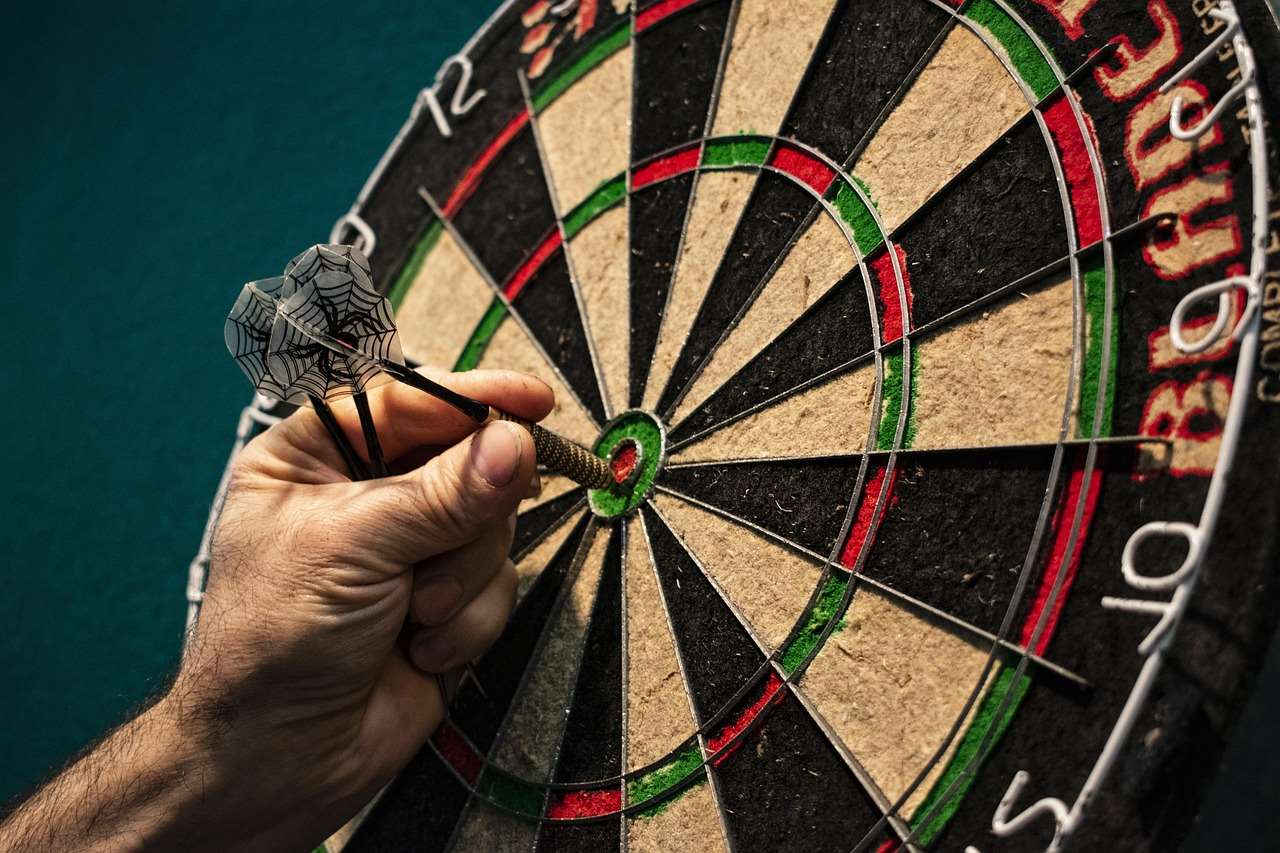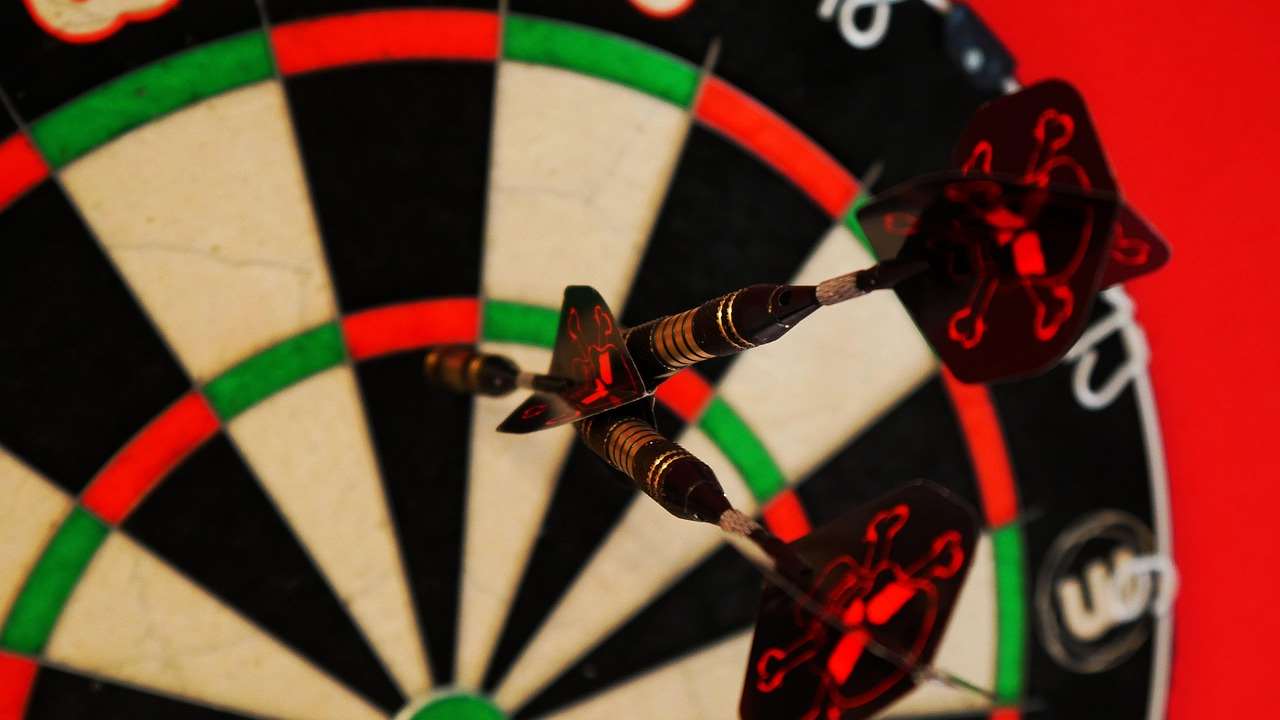The darts match length can vary significantly depending on the format of the game and the number of players involved. Generally, a professional match can last several hours, while a casual game between friends might only take a few minutes. This article will delve into the specifics of darts match length across different game formats, providing you with a comprehensive understanding and useful tips to plan your next darts session.
⚠️ Still Using Pen & Paper (or a Chalkboard)?! ⚠️
Step into the future! The Dart Counter App handles all the scoring, suggests checkouts, and tracks your stats automatically. It's easier than you think!
Try the Smart Dart Counter App FREE!Ready for an upgrade? Click above!
Understanding the factors that influence darts match length is crucial for both players and organizers. Whether you’re a seasoned pro or a casual player, knowing how long a game might take allows for better time management and ensures everyone enjoys the experience. This guide will explore various match formats, leg lengths, and the impact of player skill on the overall duration of a game. We’ll also examine the different scoring systems that contribute to the overall darts match length and provide some practical tips for speeding up or extending the game based on your preferences.
Understanding Darts Match Length Across Different Formats
The length of a darts match is heavily influenced by the chosen format. Let’s explore some of the most common formats and how they affect the overall darts match length.
- 501: This is perhaps the most popular format, where players start with 501 points and aim to reduce their score to zero. The darts match length for 501 can vary depending on the number of legs and sets required to win. A single leg might take a few minutes, but a best-of-five set could easily extend to an hour or more, depending on the skill levels of the players. A higher level of competition will often lead to a shorter darts match length as players are more efficient.
- 301: Similar to 501, but starting with 301 points. This typically leads to a shorter darts match length compared to 501.
- Cricket: This format involves closing out numbers rather than reaching a specific score. The darts match length is less predictable as it depends on the speed at which players can “close” their numbers. It can be quicker or slower than 501, depending on the players’ skill and strategy.
- Around the Clock: In this game, players aim to hit every number from 1 to 20 in order. This format generally has a more predictable darts match length, although skill will always impact the exact duration.
- Best of Legs/Sets: Many darts matches are played as a “best of” series, meaning the player who wins the majority of legs or sets takes the overall victory. The number of legs and sets determines the darts match length significantly. A best-of-five set match will naturally be longer than a best-of-three.

Considering the different formats can significantly affect your planning. For example, if you are arranging a casual evening of darts with friends, a shorter format like 301 or Cricket might be preferable, ensuring a quicker game. For a more serious competition, the longer and more strategic 501 format would be more suitable. It is essential to consider the skill level of the players as well. Beginners may take longer to complete a match in any format, resulting in a longer darts match length.
Factors Influencing Darts Match Length
Player Skill Level
The skill level of the players is arguably the most significant factor influencing darts match length. Experienced players, with higher averages and better finishing abilities, will naturally complete a game much faster than less experienced players. Consistent scoring and efficient checkouts dramatically reduce the overall time it takes to complete a match.
Leg Length
The number of points required to win a leg directly impacts the darts match length. 501 games, for example, naturally take longer than 301 games. Shorter leg lengths translate to shorter matches, and vice versa.
Number of Legs and Sets
The number of legs and sets in a match dictates the overall duration. A best-of-three set match with three legs per set will be much shorter than a best-of-seven set match with five legs per set. This is a crucial element to consider when estimating the darts match length, especially for tournament settings.
Breaks and Interruptions
Unexpected breaks, such as players needing to adjust their equipment, or even short conversations between players and viewers, can extend the overall darts match length. In professional matches, these breaks are often regulated, but in casual games, they can unpredictably increase the duration.

To optimize your game duration, selecting the appropriate format and considering the player skill levels is crucial. Beginners might enjoy shorter formats to stay engaged, while experienced players may prefer the challenge of longer games. Remember that even the best players can have a bad night, potentially extending the darts match length beyond expectations.
Planning Your Darts Match: Estimating the Length
Accurately estimating the darts match length is helpful for scheduling and ensuring everyone involved has sufficient time. While it’s impossible to give an exact prediction, here are some tips:
- Consider the Format: A 501 match will generally be longer than a 301 match.
- Assess Player Skill: Experienced players will finish quicker.
- Set a Time Limit: If time is a constraint, consider setting a time limit to ensure the game concludes within a reasonable timeframe. This could involve adjusting the number of legs or sets depending on available time.
- Allow for Breaks: Account for potential breaks and interruptions.
For a casual match between friends, planning a short format and considering the players’ skill levels will lead to a more realistic expectation of the darts match length. If time is critical, having a pre-determined finish time is a wise strategy. For more formal tournaments, reviewing past match results for similar player matchups could give you an indication of the expected duration. Don’t forget, however, that unexpected circumstances and player performance can always have an impact on the actual darts match length. You may even want to consider utilizing a Dart Counter App to accurately track the game and time played.
Tips for Optimizing Darts Match Length
Whether you want a longer, more strategic game, or a quick, fun session, you can adjust several aspects to suit your needs. Here are some tips:
- Choose the Right Game Format: Select a format that best suits your available time and the skill level of the players.
- Adjust the Number of Legs/Sets: More legs and sets mean a longer match.
- Encourage Efficient Play: Remind players to focus and avoid unnecessary delays.
- Use a Timer: Using a timer can add an element of pressure and potentially speed up the game.
- Have a Clear Starting and Ending Time: Set a definitive start and end time to keep the game on schedule.

Remembering these factors when planning your darts session will allow for a more accurate estimation of the darts match length. Careful planning will ensure the event fits within your schedule and that everyone has a great time, irrespective of the game’s duration. Remember, the goal is to have fun and enjoy the game!
Troubleshooting Common Darts Match Length Issues
Sometimes, even with careful planning, issues can arise affecting the darts match length. Here are some solutions for common problems:
- Game Dragging On: Consider shortening the game format or the number of legs/sets. A time limit can help too.
- Game Finishing Too Quickly: Extend the format, increase the number of legs/sets, or choose a more challenging game variation.
- Disputes: Ensure clear rules are established before the game begins to minimize disputes that might delay the match.
By anticipating potential issues and having solutions ready, you can ensure a smooth and enjoyable darts experience regardless of the final darts match length. Always prioritize the enjoyment of the game over strict adherence to the time constraints.
The Impact of Different Scoring Systems on Darts Match Length
The scoring system used will affect the darts match length. 501, 301, and other point-based games have a more variable length than games like Cricket, which relies on hitting specific numbers. The complexity of the checkout in point-based games adds to the overall time investment in comparison to Cricket. A player’s ability to execute efficient checkouts considerably influences the darts match length, especially in higher-stakes matches where the pressure to finish can extend the game.

Understanding the nuances of different scoring systems is crucial for accurate darts match length estimations. For instance, a 501 game might run longer on average than a 301 game due to the extra points needing to be scored. But, a skilled player could shorten this dramatically, whilst an unskilled player might extend the game considerably. This unpredictability adds to the exciting nature of the game.
Professional vs. Casual Darts Match Length
Professional darts matches often follow a structured format with a predetermined number of legs and sets, leading to a relatively predictable darts match length. However, even in professional settings, unexpected factors such as close games or unexpected delays might influence the overall time. Casual games, on the other hand, are often more flexible, and the darts match length can vary widely based on the players’ preferences and skill levels. The casual nature often translates to longer breaks, conversations, and potentially more relaxed playstyles, which affects the pace of the game.
Considering the difference between professional and casual environments is crucial when estimating the time commitment involved. A casual game might extend beyond expectations, whereas a professional match may be quite accurately predicted using historical data. The context is essential when thinking about darts match length.

Understanding the nuances of darts match length, from the influence of various game formats to the impact of player skill, enables both casual players and organizers to plan accordingly. This includes choosing appropriate formats, managing expectations, and optimizing the game experience for all involved. Whether aiming for a fast-paced session or an extended strategic challenge, knowing how to estimate and manage the darts match length is a crucial skill for any darts enthusiast. Perhaps after reading this, you’ll be able to even predict the darts match length better than before!
Remember to check out our other resources on topics like dart barrel builder, darts low scores, and dart iron shaft for more information on improving your game. If you’re looking to get started, you can find out where can i find a dartboard.
For those interested in professional darts, you might want to learn more about what is the darts masters and check out some darts final match stats for insights into the game. We’ve even got information on target darts black friday deals to help you save money! And for those keeping score, don’t forget our dart map count information. We hope you found this guide on darts match length informative and helpful. Happy darting!
Hi, I’m Dieter, and I created Dartcounter (Dartcounterapp.com). My motivation wasn’t being a darts expert – quite the opposite! When I first started playing, I loved the game but found keeping accurate scores and tracking stats difficult and distracting.
I figured I couldn’t be the only one struggling with this. So, I decided to build a solution: an easy-to-use application that everyone, no matter their experience level, could use to manage scoring effortlessly.
My goal for Dartcounter was simple: let the app handle the numbers – the scoring, the averages, the stats, even checkout suggestions – so players could focus purely on their throw and enjoying the game. It began as a way to solve my own beginner’s problem, and I’m thrilled it has grown into a helpful tool for the wider darts community.